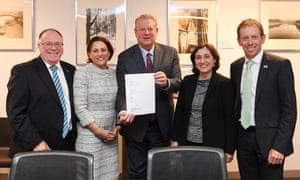Extract from The Guardian
Queensland’s
plan to slash carbon pollution would generate “ongoing discussion”
about shutting coal-fired power stations, despite expert advice that the
need for closures was more than a decade away, the deputy premier,
Jackie Trad, has said.
While the Palaszczuk government was determined to drive Queensland’s transformation from Australia’s biggest carbon polluter to a zero net emitter by 2050, it would rely for now on the economics of renewable energy and the “goodwill and leadership of industry” where national political leaders had failed, she said.
Trad also said it would be “ridiculous” for the government to promise to stop the contentious Adani mine, given the company had stuck to legislative requirements and prevailed against a string of legal challenges.
But she said Adani’s “whole future” was tied to what happened in India’s energy market, where solar power recently came in cheaper than coal-fired power.
Speaking in the wake of meetings with Al Gore, who last week said it was “just nuts” to contemplate government funding for Adani’s mine infrastructure, Trad said the former US vice president turned climate action advocate had not broached the topic with her.
“But we acknowledge that we need to work on transitioning our
economy, and one of the things that we need to understand and know is
that the global thermal coal markets will change, they will fluctuate,
but they are on a general trajectory downwards in terms of relying on
coal,” Trad told Guardian Australia.
While there was “overwhelming support” in Queensland for climate action, there was also public demand for a “just transition” in the economy that took account of the importance of resource sector jobs.
“This is an enormous challenge and Queensland does emit a lot of carbon emissions, carbon pollution,” Trad said.
The state government has vowed to restore tree clearing protections if it wins the next election, something it could not do in minority government. Trad said this was “without a doubt” the least costly way of making deep cuts in Queensland’s carbon emissions, which accounted for 28.3% of the national total in 2015, more than any other state.
“Yes, there will be people who don’t want to see their property rights reduced and they want to do what they want to do on their properties,” she said. “But the time is now for us to understand that there is a significant imperative that goes well beyond the boundary fence of any one property.
“And quite frankly … a lot of the land clearing that’s happened has happened in Great Barrier Reef catchments [and] if we want to create a resilient reef we’ve got to reduce the amount of rubbish that is flowing into the reef.”
Conservation groups welcomed the government’s 2050 zero net emissions target, announced last week as part of its climate change transition and adaptation strategies, but noted it was light on detail about how it would be achieved.
Carbon cuts through tree clearing protections and a shift to 50% renewable energy by 2030 – the latter reducing total emissions by 30% – would account for less than half Queensland’s current carbon pollution.
Tim Seelig of the Queensland Conservation Council said the government would have to start talking about winding down coal-fired generation or thermal coal mines within the next few years.
“Ultimately, it’s hard to see how they can get there otherwise,” Seelig said.
Trad said the 2030 target was an interim goal that the government’s advisory panel said did not require coal plant closures.
“We haven’t talked about retiring any of our coal-fired fleet because ... Queensland’s fleet is actually quite young in terms of our power generation,” she said.
It made sense in a national energy market for “the older, dirtier fleets to be retired and then work your way through and then the economy and the energy generation grid is changing, which it is doing at quite a rapid rate”.
“But clearly [coal plant closures] will be an ongoing discussion in Queensland, in the national community and the local community, because we do know that in the global energy market, investment in renewable energy generation is skyrocketing.”
A key takeout from her “inspirational and energising” encounters with Gore – during which Queensland signed up with other states to a “climate leadership declaration” – was his observation on “exponential” jobs growth in renewables in the US.

While the Palaszczuk government was determined to drive Queensland’s transformation from Australia’s biggest carbon polluter to a zero net emitter by 2050, it would rely for now on the economics of renewable energy and the “goodwill and leadership of industry” where national political leaders had failed, she said.
Trad also said it would be “ridiculous” for the government to promise to stop the contentious Adani mine, given the company had stuck to legislative requirements and prevailed against a string of legal challenges.
But she said Adani’s “whole future” was tied to what happened in India’s energy market, where solar power recently came in cheaper than coal-fired power.
Speaking in the wake of meetings with Al Gore, who last week said it was “just nuts” to contemplate government funding for Adani’s mine infrastructure, Trad said the former US vice president turned climate action advocate had not broached the topic with her.
While there was “overwhelming support” in Queensland for climate action, there was also public demand for a “just transition” in the economy that took account of the importance of resource sector jobs.
“This is an enormous challenge and Queensland does emit a lot of carbon emissions, carbon pollution,” Trad said.
The state government has vowed to restore tree clearing protections if it wins the next election, something it could not do in minority government. Trad said this was “without a doubt” the least costly way of making deep cuts in Queensland’s carbon emissions, which accounted for 28.3% of the national total in 2015, more than any other state.
“Yes, there will be people who don’t want to see their property rights reduced and they want to do what they want to do on their properties,” she said. “But the time is now for us to understand that there is a significant imperative that goes well beyond the boundary fence of any one property.
“And quite frankly … a lot of the land clearing that’s happened has happened in Great Barrier Reef catchments [and] if we want to create a resilient reef we’ve got to reduce the amount of rubbish that is flowing into the reef.”
Conservation groups welcomed the government’s 2050 zero net emissions target, announced last week as part of its climate change transition and adaptation strategies, but noted it was light on detail about how it would be achieved.
Carbon cuts through tree clearing protections and a shift to 50% renewable energy by 2030 – the latter reducing total emissions by 30% – would account for less than half Queensland’s current carbon pollution.
Tim Seelig of the Queensland Conservation Council said the government would have to start talking about winding down coal-fired generation or thermal coal mines within the next few years.
“Ultimately, it’s hard to see how they can get there otherwise,” Seelig said.
Trad said the 2030 target was an interim goal that the government’s advisory panel said did not require coal plant closures.
“We haven’t talked about retiring any of our coal-fired fleet because ... Queensland’s fleet is actually quite young in terms of our power generation,” she said.
It made sense in a national energy market for “the older, dirtier fleets to be retired and then work your way through and then the economy and the energy generation grid is changing, which it is doing at quite a rapid rate”.
“But clearly [coal plant closures] will be an ongoing discussion in Queensland, in the national community and the local community, because we do know that in the global energy market, investment in renewable energy generation is skyrocketing.”
A key takeout from her “inspirational and energising” encounters with Gore – during which Queensland signed up with other states to a “climate leadership declaration” – was his observation on “exponential” jobs growth in renewables in the US.

“There is a trend happening and it is our obligation as a state government to make sure that we identify this trend because not only is it important for our planet in terms of keeping global temperatures below that 2C threshold, but also in terms of making sure that our economy transitions in a just way and we get the industry and the jobs,” she said.
“That’s the sustainable economy that we need to prepare for. If we don’t prepare for it, we won’t get it.”
Since the government set its clean energy target when coming to office, more than $2bn had been invested in large scale renewable energy, Trad said.
Trad said in the absence of a national price signal on carbon, state governments trying to fill “a void” in political leadership were “relying on, number one, the economics of renewable energy, which is getting cheaper all the time”.
“We’ve seen in places like India for example, the price of solar renewable energy generation dropped, significantly, below coal-fired generation power,” she said. “It’s that sort of economic imperative for industry, consumers and large scale corporations that are going to drive investment.
“That’s what we’re relying on, that and the goodwill and leadership of industry to play a role where ... political leaders have failed.
“I go to boardroom lunches and industry is preparing for it. They actually understand there is a significant trend happening globally and that if they don’t have a business plan and an idea about how they going to incorporate some sort of carbon price-type of solution, then they will be left short.
“We know that Malcolm Turnbull is showing no leadership on this, that he is dithering in a deeply divided party room around action on climate change.
“While he’s doing that, states and territories are getting on with the job of setting targets, working through plans, implementing policies that are actually going to make a difference.”
The Palaszczuk government, in its attempts to contrast its environmental credentials with the Liberal National party opposition, has often come under criticism for its public support of Adani’s Carmichael mine.
While Australia’s largest proposed thermal coal mine is a lightning rod for the conservation movement, which decries it as a “carbon bomb” to be exported to Asia, the Queensland government has been loath to stand in the way of a project promising almost 1,500 net jobs in a regional mining downturn.
Trad said that “to be clear we never went to the election saying we were going to stop Adani – that would be ridiculous”.
“But what we do know is that we need to find the resource sector jobs of the future. That’s what people want us to do.”
But Trad said the contrast of Labor’s handling of the project with the former LNP government was obvious.
“What Campbell Newman was going to do was give them $500m for their railway, and give them a royalty holiday, and dump 3m cubic metres of dredge spoil on the Great Barrier Reef.
Asked whether the government could stop Adani if it wanted to, Trad said the company had “applied for mining licences under our legislation and it’s been appealed in several courts now and nothing’s been upheld”.
“So that is what it is.”
Trad said the “whole future of Adani is actually 100% leaning to what India does in terms of its energy generations of the future”.
“The cost of solar energy in India actually came in at much less than coal-fired energy recently when they put out the auction.
“That’s the stuff that’s happening because technology has improved. This is the stuff that’s going to change the global energy market.”

No comments:
Post a Comment